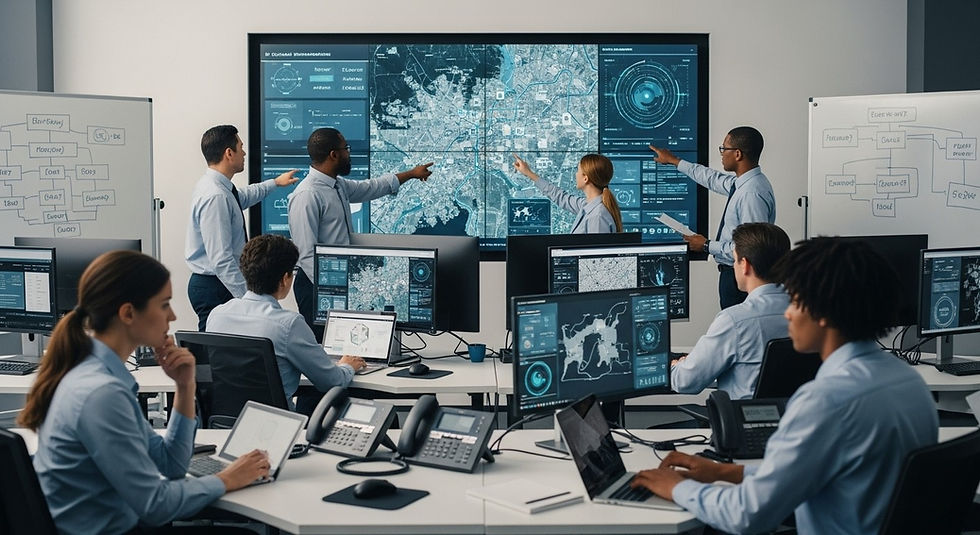Preparedness Matters: Emergency Response Training for Outdoor Lovers
- seo coder
- Apr 17, 2025
- 4 min read
Updated: Apr 18, 2025

Exploring nature is exciting but it can also be a risky feat. The situation can quickly become serious if someone gets hurt or falls sick.
Think about being deep in the woods when a friend falls and cannot walk, or someone has a severe allergic reaction. You might feel scared and helpless without knowing what to do.
That is why you need to continuously expand your knowledge and skills to be prepared for emergencies.
Learning even the basic skills can make a big difference. You can stay calm and help others with smart choices during emergencies with the right training. The knowledge can make your outdoor adventures more confident and safe.
Is your organization prepared for the unexpected? Find out how comprehensive emergency management solutions from Business Contingency Group can improve your readiness.
Why Outdoor Emergency Response Training is Important for Safety and Preparedness

We always hope that emergencies do not happen but if they do and you are not prepared then the result can be very serious. This is the reason that outdoor emergency response training is very important.
Outdoor emergency response training helps people gain the knowledge and skills that they need in emergencies. It also helps them become confident so they can handle emergencies that happen in the wild or in places far from cities.
Here is why you need emergency preparedness training if you are an outdoor activity lover.

1. Understanding the Risks of Outdoor Activities

Outdoor activities bring joy and adventure but they also carry risks. Nature can be difficult to deal with. You may face bad weather or wild animals. You may also get hurt while walking on rough land or face medical problems suddenly. These are some emergencies that often happen during outdoor trips:
Medical problems like broken bones, twisted ankles, or allergies can happen anytime.
Hypothermia and heat stroke can happen when the temperature is too cold or too hot.
People may get lost if they are in a new place that has no signs or if the weather is foggy or dark.
Natural disasters like storms or fires may suddenly change the trip.
Dangerous animals like bears or snakes may appear, and it is important to know what to do during those moments.
These problems may become worse without the right training, especially when there is no hospital nearby. This shows how emergency response training can save lives.
2. Promote Safety Through Preparedness

The main aim of outdoor emergency response training is to help people stay safe. It does this by teaching them how to be ready and how to act when something goes wrong. It is very important to know what to carry and what to do before starting an outdoor trip.
These are some important skills taught in emergency response training:
First aid and CPR help you treat someone quickly when they are hurt or not breathing. These skills let you give help until a doctor arrives. You may need to do chest compressions or stop bleeding.
Wilderness first aid teaches special ways to help people in faraway places. You may need to use sticks or cloth to fix broken bones. You may also need to treat cold or heat problems or help someone while waiting for help to arrive.
Navigation helps you read maps or use a compass. This skill helps you avoid getting lost and helps you find your way back if you are off track.
Building a fire and a shelter is important if you are stuck outside for a long time. This keeps you warm and safe during storms or cold nights.
Search and rescue skills are needed if someone goes missing. These skills help the group find the lost person quickly and safely.
These skills can make you feel more confident and they can stop problems from becoming worse.
3. Respond Effectively to Emergencies

A big benefit of emergency training is that it helps people stay calm and act wisely when there is a problem. When something bad happens, people often feel afraid or unsure. Training helps you stay focused and act the right way.
You need to think clearly and act fast in an emergency. Training gives you a plan to follow. You will know how to treat injuries or call for help or make an emergency plan. This makes your actions safe and helpful.
4. Build Confidence and Leadership Skills

Emergency management solutions do not only help you stay safe. It also helps you become a better leader. When there is an emergency someone must take charge and lead others. Training gives you the courage and ability to do that.
A strong leader keeps the group calm and focused. This makes it easier to fix the problem. Also when you know you are ready for emergencies you feel more relaxed and enjoy your time outside.
5. Improve Group Dynamics

This training makes teamwork stronger if you hike with friends or lead a team on a trip or work with a large outdoor group. It teaches people to talk clearly and help each other. A trained team can work better under pressure.
A group with emergency training can stay calm and act as a unit. They can also see problems early and stop accidents before they happen. This keeps everyone safe and ready to help if needed.
6. Ensures a Quick Response to Medical Needs

Time is the most important thing in some cases. A delay in helping someone may lead to a worse problem. This is very true in far places where doctors are not close. Emergency training helps people act fast and choose the right steps.
If someone is bleeding a lot or having a stroke or showing signs of shock the trained person can help them quickly. They can also plan how to get help or move the person to a safe place.
Conclusion
If you enjoy outdoor activities or spend time outside in any way, then emergency response training is a smart choice. It gives you the skills to help yourself and help others. Being safe is not just about avoiding danger but also about being ready for what might happen. When you are trained you feel confident and calm. That can make all the difference when something goes wrong.
Outdoor Emergency Response Training can equip you with the right skills and enable you to face unexpected situations. Remember that your investments in training can ensure that your adventure remains safe and exciting




Comments